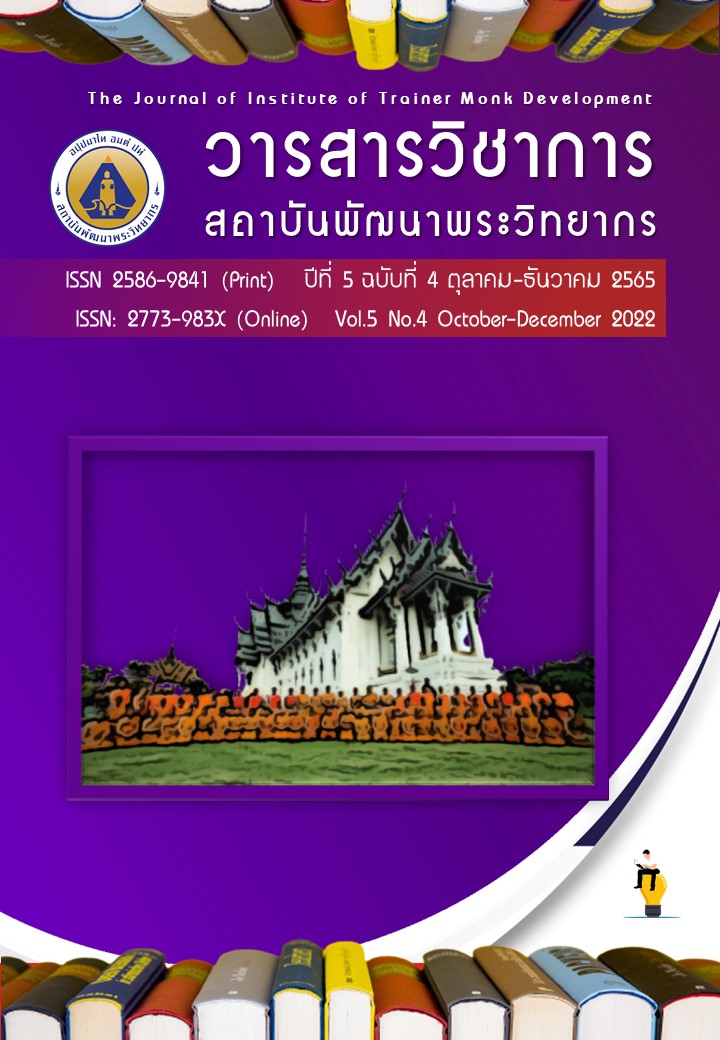Leadership of School Principal in New Normal Age
Main Article Content
Abstract
New Normal Age, living normal life in a new way causing rapid changes in the present. From the situation of the corona virus 2019 (COVID-19) epidemic affecting the lives of everyone in society and in all sectors. In the education sector, there has been a big adjustment in the management of learning using distance technology for students. Therefore, school principal an important role in meeting the learning needs of students in the New Normal Age. Leadership of school principal in educational institutions in order to effectively achieve the objectives and goals of the organization.
The leadership of school principal in the New Normal Age is to have a broader vision of current changes. Interact with teachers, students and parents. Depending on the situation in each region, various government and private sector institutions will help reduce the risk of the corona virus 2019 (COVID-19). Student centered learning management is as follows: 1. Implementing curricula, adapting to the situation. 2. Adjusting the measurement and evaluating student learning outcomes. Due to differences in students by using various measurement tools suitable for each student. 3. Integrated teaching and learning management with the use of technology. 4. A learning resource for students to use for real and effective use. 5. Continually develop teachers and educational personnel. 6. Provide opportunities for teachers, parents, students, and communities to share their opinions and solve problems together.
Article Details

This work is licensed under a Creative Commons Attribution-NonCommercial-NoDerivatives 4.0 International License.
บทความที่ได้รับการตีพิมพ์เป็นลิขสิทธิ์ของวารสารวิชาการสถาบันพัฒนาพระวิทยากร
ข้อความที่ปรากฎอยู่ในบทความที่ได้รับการตีพิมพ์ในวารสาร ถือเป็นความรับผิดชอบของผู้เขียนบทความ และข้อคิดเห็นนั้นไม่ถือว่าเป็นทัศนะและความรับผิดชอบของกองบรรณาธิการวารสารวิชาการสถาบันพัฒนาพระวิทยากร
References
กรมสุขภาพจิต.(2563). New Normal ชีวิตวิถีใหม่. สืบค้นเมื่อวันที่ 15 ตุลาคม 2565 จาก https://www.dmh.go.th/news/view.asp?id=2288
คณะกรรมการการศึกษาแห่งชาติ, สำนักงาน. (2553). พระราชบัญญัติการศึกษาแห่งชาติ พ.ศ.2553. กรุงเทพมหานคร: พริกหวานกราฟฟิค.
ชูชาติ พ่วงสมจิตร์. (2544). ภาวะผู้นำ. เอกสารประกอบการสอนวิชา 1065101 หลักและทฤษฎีบริหารการศึกษา. กาญจนบุรี.
โชษิตา ศิริมั่น. (2564). ทักษะการบริหารสถานศึกษาของผู้บริหารในภาวะวิกฤตโควิด-19 ของสถานศึกษาในสังกัดสำนักงานเขตพื้นที่การศึกษามัธยมศึกษา เขต 31 การประชุมวิชาการระดับชาติ ครั้งที่ 8: เรื่อง สู่ชีวิตวิถีใหม่ด้วยงานวิจัยทางสุขภาพและบริการ. นครราชสีมา.
ณัฐพัชร์ บุญเกตุ. (2565). การบริหารการจัดการเรียนรู้ในยุคฐานวิถีชีวิตใหม่ของโรงเรียนขยายโอกาสทางการศึกษา สังกัดสำนักงานเขตพื้นที่การศึกษาประถมศึกษาสุโขทัยเขต 2. วิทยานิพนธ์ครุศาสตร
มหาบัณฑิต. มหาวิทยาลัยราชภัฏอุตรดิตถ์.
ธีระ รุญเจริญ. (2546). การบริหารโรงเรียนยุคปฏิรูปการศึกษา. กรุงเทพฯ: แอล. ที. เพรส.
ธีระ รุญเจริญ. (2550). ความเป็นมืออาชีพในการจัดและบริหารการศึกษายุคปฏิรูปการศึกษา. กรุงเทพมหานคร: ข้าวฟ่าง.
วิโรจน์ สารรัตนะ. (2547). ภาวะผู้นำ: จากทฤษฎีสู่ข้อเสนอตัวแบบหลักสูตรพัฒนาบุคลากร. วารสารศึกษาศาสตร์. 27: 40–52.
ศิริพงษ์ เศาภายน. (2550). หลักการบริหารการศึกษา: ทฤษฎีและแนวปฏิบัติ. (พิมพ์ครั้งที่ 3). กรุงเทพมหานคร: บุ๊คพอยท์.
ศรสวรรค์ บุญณกรณ์ชัย. (2561). ภาวะผู้นำของผู้บริหารสถานศึกษาในศตวรรษที่ 21 โรงเรียนทวีธาภิเศก สังกัดสำนักงานเขตพื้นที่การศึกษามัธยมศึกษา เขต 1. ปริญญานิพนธ์ ศึกษาศาสตรมหาบัณฑิต. มหาวิทยาลัยเกริก.
สุเทพ พงศ์ศรีวัฒน์. (2550). ภาวะความเป็นผู้นำ. กรุงเทพมหานคร: เอ็กซเปอร์เน็ท.
สำนักงานคณะกรรมการการศึกษาแห่งชาติ. (2553). พระราชบัญญัติการศึกษาแห่งชาติ 2553.กรุงเทพมหานคร: สำนักงานคณะกรรมการการศึกษาแห่งชาติ.
สำนักงานรับรองมาตรฐานและการประเมินคุณภาพการศึกษา. (2550). รายงานการประเมินคุณภาพภายนอกสถานศึกษาระดับการศึกษาขั้นพื้นฐาน รอบ 2 (พ.ศ.2549–2553). ม.ป.ท.: ม.ป.พ.
สำนักงานราชบัณฑิตยสภา. (2563). พจนานุกรมศัพท์นิเทศศาสตร์ ฉบับราชบัณฑิตยสภา. กรุงเทพมหานคร: สำนักงานราชบัณฑิตยสภา.
สำนักงานเลขาธิการสภาการศึกษา. (2558). โครงการปฏิรูปการเรียนรู้สู่ผู้เรียน (พ.ศ. 2557-2560) สะท้อนปัญหาและทางออกตอบโจทย์ปฏิรูปการศึกษาไทย. กรุงเทพมหานคร: โรงพิมพ์คุรุสภาลาดพร้าว.
อวยชัย ชบา. (2538). ภาวะผู้นําและวัฒนธรรมองค์กร. เอกสารการสอนวิชาพฤติกรรมองค์กร
และการจัดการการตลาดหน่วยที่ 7 (165-166). กรุงเทพมหานคร: โรงพิมพ์มหาวิทยาลัยสุโขทัยธรรมาธิราช.
Daft, L. (1999). Leadership: Theory and practice. Orlando: The Dryden Press Harcourt Brace College Publishers.
Stogdil, R. M. (1974). Handbook of leadership. New York: The free Press, A Division of Macinillan.
Yukl, G. A. (1989). Leadership in organizations. New Jersey: Prentice–Hall.


